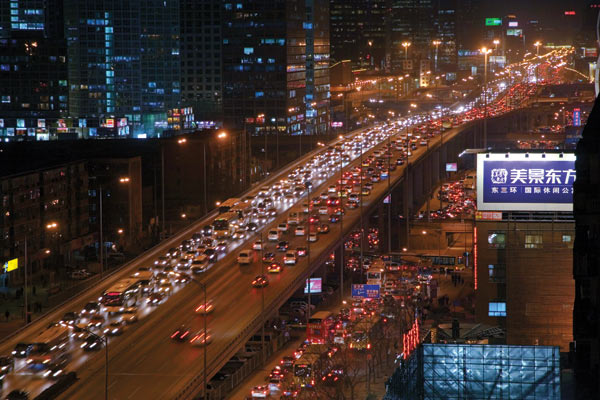Getting Beyond Petroleum Won’t Be Easy

Transportation defines our civilization. Where we live and work, the structure of our cities, the flow of global commerce–all have been shaped by transportation technologies. But modern transportation’s reliance on fossil fuels cannot be sustained. Passenger planes, trains, and automobiles were responsible for nearly four billion tons of carbon dioxide emissions in 2005–about 14 percent of the carbon dioxide emitted globally that year. If we continue to rely almost exclusively on petroleum to power these vehicles, they will be responsible for 11 billion to 18 billion tons of carbon dioxide emissions in 2050. That’s because developing nations–which are home to 82 percent of the world’s population and will be responsible for 98 percent of population growth in coming years–are on the verge of mass motorization. Auto ownership in the developing world is growing at a rate of 30 percent per year (see “Cleaner Vehicles by the Million”).
In the developed world, carbon emissions from transportation are also a steadily growing problem. U.S. passenger transportation is responsible for 18 percent of America’s greenhouse-gas emissions. Reducing these emissions by transforming the habits of consumers in America’s deeply entrenched car culture won’t be easy, but it would yield significant global benefits.
Relatively wealthy U.S. drivers can afford to adopt new alternative transportation technologies, and after a century’s dominance by the internal-combustion engine and gasoline, these technologies, such as electric vehicles and biofuels, are finally becoming competitive (see “Petroleum’s Long Good-bye”). But they still have a long way to go, and they must be fostered with coherent government policy (see “Washington Backs Plug-ins”) if they are to displace fossil-fuel power.
As our world continues to globalize and urbanize, the issue of congestion, on the streets and in the air, must also be addressed with the help of information technology that can allow cars and planes to organize themselves into efficient traffic patterns (see “Urban Renewal” and “Satellites for Speedy Skies”). Needed most of all is a coherent transportation policy that promotes alternatives to fossil fuels while mandating that gasoline- and diesel-powered cars continue to become more fuel-efficient. And as the world’s population becomes increasingly urban, we need to modify the structure and operation of our cities so that someone who needs to buy groceries or get to work doesn’t have to fire up an internal-combustion engine to do it.
Keep Reading
Most Popular
Large language models can do jaw-dropping things. But nobody knows exactly why.
And that's a problem. Figuring it out is one of the biggest scientific puzzles of our time and a crucial step towards controlling more powerful future models.
How scientists traced a mysterious covid case back to six toilets
When wastewater surveillance turns into a hunt for a single infected individual, the ethics get tricky.
The problem with plug-in hybrids? Their drivers.
Plug-in hybrids are often sold as a transition to EVs, but new data from Europe shows we’re still underestimating the emissions they produce.
Stay connected
Get the latest updates from
MIT Technology Review
Discover special offers, top stories, upcoming events, and more.